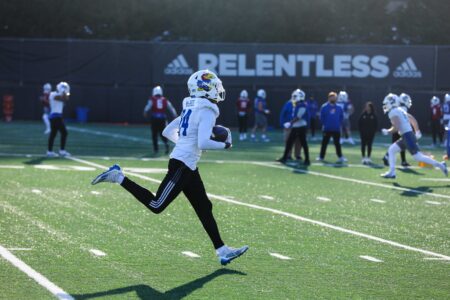College football keeps carving out space on Friday nights

photo by: Photo by Angilo Allen/Kansas Athletics
Kansas fans fill the newly renovated Touchdown Club at David Booth Kansas Memorial Stadium during the seaosn opener against Tennessee Tech on Sept. 2, 2022.
At a recent press conference, after Kansas football moved each of its first two games of 2023, at home against Missouri State and Illinois, to Fridays, Kansas football coach Lance Leipold predicted further growth in this domain.
“In today’s world of where it’s going in TV contracts and that, you’re starting to see it: Friday night college games are going to be (happening) more and more frequently,” he said on June 13. “That’s just what it’s going to be. And just like I’m sure there’s times where I know it’s not always convenient for our fan base … I’m sure it’s not always easy to drive to Lawrence on a Monday night for a basketball game.”
Leipold has a point. Weekday college football games are already a staple among the Group of Five conferences — devout fans have become well acquainted with Mid-American Conference “MACtion” matchups that often air totally unopposed on ESPN networks on mid-autumn Tuesday and Wednesday nights. But these are growing in number, not just because Conference USA is challenging the MAC for Tuesday and Wednesday supremacy this year, but also because higher-level leagues like the Big Ten Conference are expanding their Friday night presence.
The Big Ten added Friday night games in its 2017 media deal and then turned its traditional Iowa-Nebraska Black Friday date into a doubleheader in its 2022 renegotiation. The FBS will soon swell to a membership of 133 schools — when I first got into college football in the mid-2000s, there were just 119 — as soon as Jacksonville State and Sam Houston State enter Conference USA on July 1, and more schools means more overall games. More overall games in turn means more teams looking for distinct temporal windows in which they can be the center of attention.
That was the stated rationale for Kansas moving its Week 2 game with Illinois to Friday, Sept. 8 — as Leipold put it, “We have a chance to be, if not the only game, one of two games, versus being buried in a group of like 30 games at one time.”
“The young men in that program deserve a chance to play in front of what is really three, four, five, six, potentially ‘X’ times the eyeballs they’re going to get on a Week 2 Saturday,” athletic director Travis Goff said on June 8 of the Illinois prime-time game.
There’s a catch, though, a trade-off for more nationwide exposure. Weeknight games serve, pretty self-evidently, to make college football much less accessible to students, alumni and basically any other people who are used to consecrating their fall Saturdays in order to attend games in person.

photo by: Nick Krug/Journal-World
Kansas head coach Lance Leipold and the Jayhawks get ready to take the field against Tennessee Tech on Friday, Sept. 2, 2022 at David Booth Kansas Memorial Stadium.
It’s one thing to know intuitively that college football has colonized more and more of the week over time, growing beyond its Saturday tradition, but it’s another to actually look at the stats. In 1998, according to data from Sports Reference, seven regular-season Football Bowl Subdivision games took place on Fridays. By 2014, that number had ballooned to 52 — a relatively under-the-radar 643% increase.
The Friday night slate has remained right around that size in the years since, reaching a low of 41 games in the pandemic-shortened 2020 season (which was actually a higher proportion of total games than the previous year) but otherwise remaining at 51 or higher.
Which brings me back to Friday night. Everyone knows that’s when high school football happens, in Lawrence and elsewhere — “‘Friday night lights’ is something that’s a coined phrase in our community,” Lawrence High athletic director Mike Gillman told the Journal-World.

photo by: Journal-World file photo
The Lawrence Lions take on the Olathe West Owls on Thursday, Sept. 8, 2022 at CBAC.
Even American lawmakers know this. As The Athletic’s Chris Vannini noted in a lengthy piece last October, the Sports Broadcasting Act, which prevents the NFL from scheduling games on Friday nights or Saturdays for most of the year, serves to protect both high school football and college football. However, no such measure exists to protect high school football from college football. A 2017 resolution by the National Federation of State High School Associations “that college and professional football teams should refrain from scheduling contests on Friday nights,” in order to make “an investment in their own future success,” did little to stem the tide. As a result, Vannini wrote, “Almost every conference has added a few games on Fridays, much to the chagrin of high school coaches and fans.”
Kansas Athletics clearly anticipated some chagrin in the Lawrence community. Speaking about the Missouri State switch, Goff apologized to fans and said he hoped there would be enough advance notice for them to adjust their plans.
“We know there’s certainly some potential inconveniences for some segment of our fans,” he said. “We’re sensitive to Fridays in terms of high school football and we’re working actively to try to come up with ways to be better partners and open up some other doors for our more local high school football programs.”
Free State athletic director Jered Shaw told the Journal-World that his school’s relationship with Kansas Athletics has been strong — KU provided its ballpark for the River City Baseball Festival, offered its indoor football practice facility when the weather was bad and so on. Overlapping football games have an impact on stakeholders at both schools.
“Sometimes, scheduling can be difficult and I know at their level it’s even more difficult,” Shaw said, “but you know, the Friday night football games, the part that I have the most sympathy for is the coaches that have student-athletes here at Free State that don’t get to watch their sons play because they have to play a game on Friday night.”
Gillman acknowledged the traditional role of Friday night high school games but cast Friday night KU action as a welcome change of pace that helps “promote college football.” He said he feels bad for his own students who won’t get the chance to attend those Friday night games, but otherwise understands the importance of giving KU a national spotlight that can be hard to come by.
LHS will play its first two games this season on Friday nights, including in Week 2 directly opposite KU’s home game against Illinois. Gillman said, though, that even with an increased number of Friday night college games like Leipold projected, “I can’t for the life of me imagine college football ever going to a Friday night consistently.”
“I don’t mind making adjustments to the schedule that’s going to be brief in nature,” he continued. “… It’s a give and take and I think it’s great for both high school and college athletics.”

photo by: Chance Parker/Journal-World
The Lawrence High student section holds up flashlights during the game against Free State on Friday, Oct. 14, 2022.
Free State is on the road in Olathe each of the first two weeks, with its opener coming on a Thursday. Generally speaking, Shaw said, playing on a Thursday isn’t too much of a detriment because students will always show up — even if community members can’t in the same numbers — but going up against a KU home game on a Friday “does hurt our environment a little bit.”
High school games get moved around for all sorts of reasons — severe weather, air quality, facility issues and so on. College football’s encroachment into high school’s domain, though, seems to be accelerating at a rate beyond any of these (though there has been quite a lot of severe weather and poor air quality lately, too!), and the absence of a relevant provision in the Sports Broadcasting Act means nothing can stop it.
The now-retired NFHS executive director Bob Gardner put it well on the occasion of the organization’s limp resolution: “We believe retaining Friday nights for high school contests is a plus for colleges as well as they reap the benefits of healthy programs at the high school level.” That was in 2017; the Friday-night tally reached its peak of 61 games four years later.







